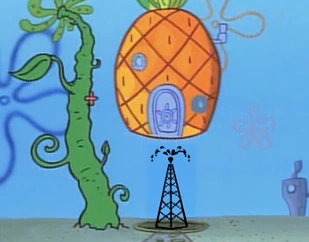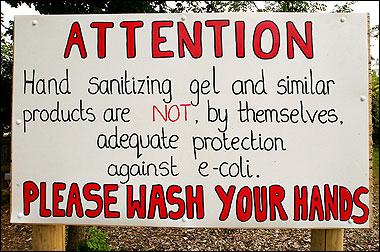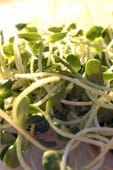New developments in the Freshway Foods romaine lettuce E. coli O145 outbreak:
1. Why the corporate finance dude shouldn’t be the public spokesthingy.
 Freshway Foods recalled romaine lettuce products sold for food service outlets, wholesale, and in-store retail salad bars and delis last week after links with over 50 sick people in Ohio, Michigan and New York were established.
Freshway Foods recalled romaine lettuce products sold for food service outlets, wholesale, and in-store retail salad bars and delis last week after links with over 50 sick people in Ohio, Michigan and New York were established.
The U.S. Food and Drug Administration said that multiple lines of evidence implicated shredded romaine lettuce from one processing facility as a source of infections in a multistate outbreak to which this recall may be related.
“The evidence includes preliminary results of product traceback investigations that indicate:
• the shredded romaine lettuce consumed by ill persons in three states originated from one processing facility;
• preliminary results of a case-control study in one state that found a statistically significant association between E. coli O145 infection;
• ingestion of lettuce from the same processing facility; and,
• recovery of E. coli O145 from an unopened package of shredded romaine lettuce from the same processing facility that was obtained from a food service entity associated with the outbreak.”
To which Freshway Foods vp of finance Devon Beer told The Packer,
“It’s really a precautionary step.”
No. It’s an outbreak and a public health step. At what point did FDA abandon epidemiology and require positive test results in an unopened package? How long were people eating potentially contaminated romaine lettuce at salad bars while regulators assembled sufficient evidence? What is the FDA policy on going public? (It doesn’t exist, at least not in any public form.) The six confirmed and suspected cases amongst students in New York’s Wappinger Central School District who came down with E. coli in April may want to know. And the lettuce they were served in the school cafeteria tested positive.
2. The suspect lettuce was grown in Yuma, Arizona
It was announced Friday that federal investigators were looking at a farm in Yuma, Ariz., as a possible source of the suspect romaine lettuce.
3. Look for pathogens and they will be found
.jpg) In the wake of the E. coli O145 outbreak in romaine lettuce, a laboratory in Ohio started testing bags of romaine and found another E. coli which lead to a very private recall on Friday.
In the wake of the E. coli O145 outbreak in romaine lettuce, a laboratory in Ohio started testing bags of romaine and found another E. coli which lead to a very private recall on Friday.
Misti Crane of the Columbus Dispatch reported this morning that the E. coli positive (strain not identified – dp) led a California company to recall about 1,000 cartons of produce that went to two customers who then processed the lettuce before sending it on to food-service establishments.
Amy Philpott, spokeswoman for Andrew Smith Co. in Spreckels, Calif., said none of the lettuce was sold in grocery stores and that only two food processors bought the cartons.
She said she didn’t know the names of those customers and did not know whether Freshway Foods in Sidney, Ohio, was one of them.
Ohio Department of Agriculture spokeswoman Kaleigh Frazier said the test was on an unopened bag of Freshway romaine shredded lettuce with a sell-by date of May 10, and her department is sending the sample on to federal officials for further testing.
Andrew Smith issued the recall privately on May 7 for lettuce that was shipped in mid-April, she said.
4. Our stuff is safe
As with the spinach outbreak of 2006, other regions are quick to proclaim the safety of their products, even in the absence of any data.
New Jersey State Agriculture Secretary Douglas Fisher said Friday that fresh romaine lettuce from New Jersey is safe.
"It certainly is an unfortunate coincidence of timing that this recall is occurring just as our farmers’ fresh romaine is coming into the market, but there is no connection between the two."
OK, but why not use the opportunity to explain the food safety steps taken by NJ lettuce growers to ensure microbiologically safe food, rather than saying we have a task force.
5. Blame consumers
 Bob LaMendola of the Florida Sun Sentinel writes the E. coli is deadly but preventable by keeping raw meat separate from other foods, cooking meat to 165F, washing produce and hands vigorously.
Bob LaMendola of the Florida Sun Sentinel writes the E. coli is deadly but preventable by keeping raw meat separate from other foods, cooking meat to 165F, washing produce and hands vigorously.
This has nothing to do with romaine lettuce at salad bars.
After the 2006 E. coli O157:H7 outbreak linked to California spinach, the 29th outbreak linked to leafy greens and after years of warning from FDA, California growers formed the Leafy Greens Marketing Agreement, which is supposed to have food safety performance standards. Yet the most noticeable achievement since the Agreement has been the containment cone of silence that has descended upon outbreaks involving leafy greens, and an apparent shift in FDA policy that sets epidemiology aside and requires positive samples in unopened product – a ridiculous standard since no one routinely tests for other Shiga-toxin producing E. coli like O145.
 With no warning one weekday morning, investigators entered an organic grocery with a search warrant and ordered the hemp-clad workers to put down their buckets of mashed coconut cream and to step away from the nuts.
With no warning one weekday morning, investigators entered an organic grocery with a search warrant and ordered the hemp-clad workers to put down their buckets of mashed coconut cream and to step away from the nuts. In the case of Rawesome, regulators allege that the group broke the law by failing to have the proper permits to sell food to the public. While the raid was happening at Rawesome, another went down at one of its suppliers, Healthy Family Farms in Ventura County. California agriculture officials said farm owner Sharon Palmer’s processing plant had not met standards to obtain a license.
In the case of Rawesome, regulators allege that the group broke the law by failing to have the proper permits to sell food to the public. While the raid was happening at Rawesome, another went down at one of its suppliers, Healthy Family Farms in Ventura County. California agriculture officials said farm owner Sharon Palmer’s processing plant had not met standards to obtain a license. 
.jpg) hospitalized. The average age of the seven cases is 29 years. In a typical year there are 32 cases of Salmonella reported in all of Butte County.
hospitalized. The average age of the seven cases is 29 years. In a typical year there are 32 cases of Salmonella reported in all of Butte County. After receiving a call from two customers saying they had bought a bag of almonds from the store and found live moths inside the bags, KTVU decided to check it out.
After receiving a call from two customers saying they had bought a bag of almonds from the store and found live moths inside the bags, KTVU decided to check it out. Freshway Foods recalled romaine lettuce products
Freshway Foods recalled romaine lettuce products.jpg) In the wake of the E. coli O145 outbreak in romaine lettuce, a laboratory in Ohio started testing bags of romaine and found another E. coli which lead to a very private recall on Friday.
In the wake of the E. coli O145 outbreak in romaine lettuce, a laboratory in Ohio started testing bags of romaine and found another E. coli which lead to a very private recall on Friday. Bob LaMendola of the Florida Sun Sentinel writes
Bob LaMendola of the Florida Sun Sentinel writes Angela Malos was just two-years-old when her parents brought her to the fair … weeks later the child was barely alive. She suffered kidney failure and several strokes. Her family said they are relieved the legal battle is over, but Angela still has lingering health problems.
Angela Malos was just two-years-old when her parents brought her to the fair … weeks later the child was barely alive. She suffered kidney failure and several strokes. Her family said they are relieved the legal battle is over, but Angela still has lingering health problems. Several other children reported getting sick after visiting the petting zoo, but Angela’s injuries were the most severe. Each case is being handled separately.
Several other children reported getting sick after visiting the petting zoo, but Angela’s injuries were the most severe. Each case is being handled separately. 600, but that ain’t worth much if an outlet allows raw shit to flood into the kitchen.
600, but that ain’t worth much if an outlet allows raw shit to flood into the kitchen.  Perhaps one of the most popular Seinfeld episodes,
Perhaps one of the most popular Seinfeld episodes,  La Bonne Soup Café was shut down Wednesday morning during a routine health inspection after a cockroach infestation was discovered. Previously, the restaurant had been inspected with a clean bill of health.
La Bonne Soup Café was shut down Wednesday morning during a routine health inspection after a cockroach infestation was discovered. Previously, the restaurant had been inspected with a clean bill of health. One of the factors that make for a successful restaurant inspection grading system is consumer confidence in the system. Do consumers feel the grade accurately represents the risk associated with dining at a particular establishment? If the answer is no, it’s unlikely the system will be used to its full potential. Sure, there will always be consumers that don’t notice (or care) about the inspection grade in an establishment window; but consumers who do care, and want to use the system, should feel it is reliable.
One of the factors that make for a successful restaurant inspection grading system is consumer confidence in the system. Do consumers feel the grade accurately represents the risk associated with dining at a particular establishment? If the answer is no, it’s unlikely the system will be used to its full potential. Sure, there will always be consumers that don’t notice (or care) about the inspection grade in an establishment window; but consumers who do care, and want to use the system, should feel it is reliable. “Now that we are three years beyond that, it’s almost always hard to go back and put our mind where it was in 2005 and 2006 because we know so much more today than we knew then.”
“Now that we are three years beyond that, it’s almost always hard to go back and put our mind where it was in 2005 and 2006 because we know so much more today than we knew then.”
